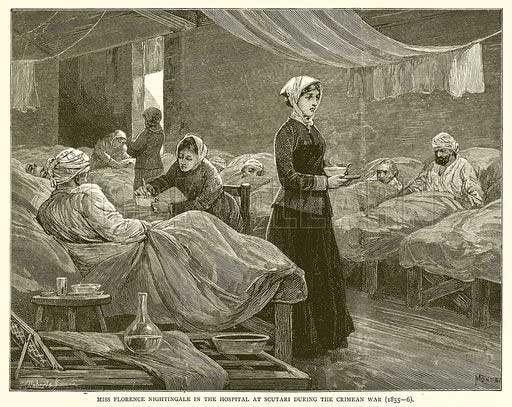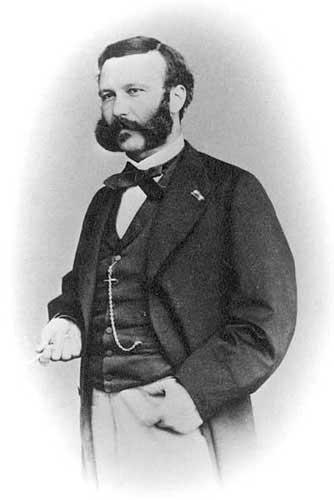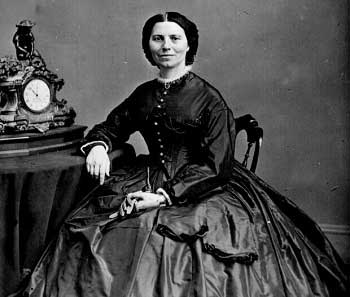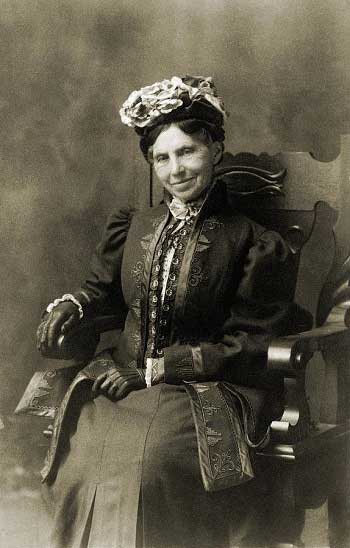A Christian Wrote: “The nursing profession was founded by Florence Nightingale out of devotion for Christ. One of historyʼs greatest humanitarian movements, the International Red Cross, was founded by Christians in response to the Scriptural injunction to care for the sick and suffering. …”
Edward: Exactly how “Christian” Florence Nightingale was, or Dunant (founder of the International Red Cross), or Barton (founder of the American Red Cross) depends on whether you also believe that freethinking anti-Trinitarians, Universalists, mystics, and gays, can all be considered “true Christians.” See the information below.
Florence Nightingaleʼs Religious Beliefs
Ed: It is quite true that Florence Nightingaleʼs beliefs and spirituality were driven by general Christian beliefs about compassion. See for instance her praise of Christianity as mentioned here.
Her Christianity, however was an all-inclusivistic one, even a Universalistic one. Florence Nightingaleʼs father and mother were both Unitarians.
Most Christians in history regarded, and still regard, Unitarianism as a heresy since Unitarians reject the Trinity, and all (or most) Unitarians also reject the notion of eternal hell. The Unitarians later joined with the Universalists to form the Unitarian-Universalist churches in America.
For Unitarian Info.
So Florence grew up believing in the transforming power of Godʼs everlasting love, and had little patience with the institutionalized churchʼs views of God when they preached about him being a God of vengeance and jealousy. See this, this and this article.

Throughout her life Florence Nightingale actively fought against the religious prejudice that existed in England. When she started her first job in England, as Superintendent of a hospital in Harley Street, she had an argument with the hospitalʼs Committee because they did not accept Roman Catholic patients. She said she would resign unless the Committee changed the rules and gave her written permission to accept not only Roman Catholics but also Jews and any other religion “and allow them to be visited by their respective priests, Rabbis, and Muftis (Islamic clerics)”. The Committee changed the rules as she demanded. Later in her life, Florence Nightingale actively worked for public health improvements in many different countries. She devoted many years of her life to developing practical schemes for village sanitation in India (which included Pakistan at that time), designed to improve the life of poor people of all religions. [from the Florence Nightingale, Avenging Angel homepage ]

Nightingaleʼs training school for nurses took women regardless of denomination — she abhorred the prevalent sectarian practice of converting patients on their deathbed to another denomination. But her school was hardly secular. Student nurses were required to attend chapel and nurses read prayers in the wards. Nightingale believed that nurses needed spiritual resources to do their difficult work. Her letters to nurses are full of biblical quotations and examples from the lives of notable, especially heroic, Christians like Dr Livingstone and General Gordon. … Nightingale was appalled when people used prayer as a substitute for practical activity. The litany was particularly abhorrent, for asking God NOT to do things only an ogre or tyrant would do anyway [like “Please God, donʼt send us the plague.”]. … “It did strike me as odd, sometimes, that we prayed to be delivered from plague, pestilence and famine when all the common sewers run into the Thames.” She thought that God want us to clean up the sewer system rather than pray to be delivered from the known consequences of unsanitary practices. She prayed instead “God deliver us from unconscientious work.”
[ from “Florence Nightingale and the Christian Origins of Public Health Care” A Sermon given at St Johnʼs Anglican Church, Elora, Ontario 23 July 2000 ]
Nightingale insisted that her own training school for nurses be secular, i.e. admit women regardless of religious affiliation, and provide nursing services rather than try for death bed conversions. Yet nurses needed the resources of God to do their work well, and her advice to nurses was heavily laced with religion. … Nightingale called philanthropy “humbug … love to mankind ought to be our one principle in the Poor Law.” She wanted quality care for all [shades of Bill and Hillary Clinton!], not a two-tiered system of good care for those who could afford it and whatever charity provided for the rest. Preventive medicine and health promotion were prominent in Nightingaleʼs conceptualization of a good health care system. Good nutrition and adequate housing were essential, as well as clean air and water. As Godʼs co-workers we needed to study the “sanitary laws” of the universe, to know what work was needed to be done. Nor were good intentions enough, but Nightingale gave frequent examples where peopleʼs, notably Christiansʼ, good intentions led to harmful results, as in the opening of a “foundling” institution resulting in increased numbers of babies being abandoned. God needed good statisticians and public administrators, not mere do-gooders (philanthropy is humbug!)
[ from Health Care as Godʼs Work Niagara Anglican, October 1999:15 ]

Questions Regarding Florence Nightingaleʼs Sexuality
It is a fact that she avoided marriage to men, even one who spent nine years proposing marriage to her, and never had children.
Was she a lesbian? See this quotation:
“I have lived and slept in the same bed with English countesses and Prussian farm women…no woman has excited passions among women more than I have.”
— Florence Nightingale
and here.
She seems to have had passionate friendships with women in her adolescence and again late in life. But for most of her life she was happier in the company of men. Whether she was bi-sexual or a lesbian, or had lesbian feelings toward other women is something we will probably never know. But it is not beyond the realm of possibility. In her day such feelings and activities were of course heavily proscribed and even against the law, and she probably would have taken care not to speak or write freely about such matters so as not to jeopardize her lifeʼs mission to improve health standards in hospitals and to help more women join the workforce and dare to pursue careers as nurses.
Florence Nightingale And Womenʼs Rights
Nightingale held strong opinions on womenʼs rights. In her book Suggestions for Thought to Searchers after Religious Truths (1859) she argued strongly for the removal of restrictions that prevented women having careers. Read by John Stuart Mill* (it influenced his book on womenʼs rights, The Subjection of Women (1869).
*John Stuart Mill was an atheist who yet still seemed to hope for something better, not an atheist who wished to destroy all Christian belief, but to live in concord with Christians: Mill wrote that where belief is not warranted, hope is still permissible, and the imagination need not be controlled by purely rational considerations.
To me it seems that human life, small and confined as it is, and as considered merely in the present, it is likely to remain even when the progress of material and moral improvement may have freed it from the greater part of its present calamities, stands greatly in need of any wider range and greater height of aspiration for itself and its destination, which the exercise of imagination can yield to it without running counter to the evidence of fact; and that it is a part of wisdom to make the most of any, even small, probabilities on this subject, which furnish imagination with any footing to support itself upon. (Mill, Essays on Religion). Above all, the conception of a morally perfect being, and of his approbation, is an inspiration for the moral life which would be sorely missed, and Christianity has provided us with an “ideal representative and guide of humanity;” nor, “even now, would it be easy, even for an unbeliever, to find a better translation of the rule of virtue from the abstract into the concrete, than to endeavor so to live that Christ would approve our life” (Essays on Religion, P. 255). “The feeling of helping God” in the struggle with evil is “excellently fitted to aid and fortify that real, though purely human religion, which sometimes calls itself the Religion of Humanity and sometimes that of Duty,” and which “is destined, with or without supernatural sanctions, to be the religion of the Future.”
Florence Nightingaleʼs Reputation Questioned Recently
Richard Brooks wrote in the Sunday Times on July 8, 2003: “Another assault is about to take place on the reputation of one of Britainʼs most illustrious figures. According to a new BBC documentary, Florence Nightingale, who has long been thought of as the caring ‘lady with the lamp’, was in fact a manipulative, neurotic and sexually repressed woman. Under her nursing supervision during the Crimean war, hundreds of wounded soldiers died unnecessarily, claim the programme makers; 10 times more men perished at her Scutari hospital near Sebastopol from illness than from wounds. ‘You would have been far better off staying at the front in a tent than in the hospital,’ said Hugh Small, author of Avenging Angel, a biography of Nightingale. Nightingaleʼs image as a maternal goddess is to be demolished in a BBC2 Reputations documentary on Tuesday week. ‘She was built up by the Victorians during the Crimean war partly because Britain needed a hero, having not had one since Nelson and Wellington,’ said Mark Bostridge, whose own biography of Nightingale will appear next year. It was not Nightingaleʼs fault that so many died at Scutari. Only when she returned to England in 1857 did she begin to realize why so many soldiers had perished. After suffering a nervous breakdown, she set out to ensure that sanitary conditions in hospitals were improved.. Nightingale also had an unsatisfactory love life, claims the documentary. ‘She had been spurned as a youngish woman by a social climber who later became an MP and then, it seems, had just one passionate romance in the Crimea with a soldier,’ said Small. Nightingale was not really a nurse, although she had some limited training before the Crimea. and while she failed to give the wounded soldiers proper medical care, she was attentive to their personal concerns. She would also write to bereaved parents saying their son had “died painlessly” even though this was more than likely untrue. ‘The legend has long been that Nightingale went to the Crimea and made things all right,’ said Bostridge. ‘She did not.’”
And…
From the Associated Press, May 2, 2003: Florence Nightingale, the founder of modern nursing who said God called her to her work, suffered from a bipolar disorder, a mental health expert said today. “Florence heard voices and experienced a number of severe depressive episodes in her teens and early 20ʼs, symptoms consistent with the onset of bipolar disorder,” said Dr. Kathy Wisner, a professor of psychiatry at the University of Pittsburgh Medical Center. Nightingale was the subject of a conference today at the University of Maryland School of Medicine that discussed Dr. Wisnerʼs theory. The annual conference has diagnosed the ills of historic figures since 1995. Dr. Wisner cited Nightingaleʼs diary and letters as evidence, including a 1851 passage that read, “Why, oh my God, can I not be satisfied with the life that satisfies so many people.” That same year, she also wrote: “This is the life. Now I know what itʼs like to live and love life.” Dr. Wisner also said the effects of bipolar disorders tended to ease when people reach their 60ʼs. When Nightingale reached the age of 68, her symptoms lessened. She died in 1910 at the age of 90.
How Specifically “Christian” Is The International Red Cross?
The International Red Cross is now known as the Red Cross And Red Crescent
(Islamic humanitarian aid society) and together they comprise the worldʼs largest humanitarian network of 178 National Red Cross and Red Crescent Societies. And letʼs not leave out the Indian (in the nation of India) Red Cross Society.
You can visit the official American Red Cross website and read about the origins of the International Red Cross.
“Christianity” is not mentioned once in the story of the origins of the Red Cross organization, only a reference to “Easter” being a day of truce during a bloody European war. The organization itself was founded to be international and not to distinguish amongst faiths or beliefs, nor was it founded to evangelize — all of which makes it a rather secular humanitarian organization.

The Founder Of The International Red Cross
(from Encyc Britannica online)
Jean-Henri Dunant
Jean-Henri Dunant Swiss humanitarian, was the founder of the Red Cross (now Red Cross and Red Crescent) and the Worldʼs Young Menʼs Christian Association. He was co-winner (with Frédéric Passy) of the first Nobel Prize for Peace in 1901. An eyewitness of the Battle of Solferino (June 24, 1859), which resulted in nearly 40,000 casualties, Dunant organized emergency aid services for the Austrian and French wounded. In Un Souvenir de Solférino (1862; A Memory of Solferino), he proposed the formation in all countries of voluntary relief societies for the prevention and alleviation of suffering in war and peacetime, without distinction of race or creed; he also proposed an international agreement covering the war wounded. In 1863 he founded the International Committee for the Relief of the Wounded (now International Committee of the Red Cross), and the following year the first national societies and the first Geneva Convention came into being.
The Sexuality Of The Man Who Founded Both The International Red Cross And The Young Menʼs Christian Association
I first learned about the founder of the International Red Cross being gay in a book written by Richard Wurmbrand, a famed evangelical Lutheran who was tortured during the era of Romanian communism. The book was titled, In Godʼs Underground, and Wurmbrand just happened to mention something about Dunant, the founder of the International Red Cross, being a homosexual. Wurmbrand himself was neither advocating nor belittling Dunant for his homosexuality.
September 25, 1828 - Jean-Henri Dunant the founder of the Red Cross movement is born in Geneva. Following his death his family burned his personal papers in an effort to suppress the fact he was a bisexual. It did not prevent the knowledge from becoming known.

The Founder Of The American Red Cross
(From Encyc Britannica online)
Clara Barton
Clarissa Harlowe Barton founder of the American Red Cross. Barton attended the Liberal Institute at Clinton, New York (1850-51), and in 1852 she established in Bordentown, New Jersey, a free school that soon became so large that the townsmen would no longer allow a woman to run it. Rather than subordinate herself to a male principal, Barton resigned. At the outbreak of the American Civil War, Barton showed characteristic initiative in organizing facilities to recover soldiersʼ lost baggage and in securing medicine and supplies for men wounded in the first battle of Bull Run. She gained permission to pass through the battle lines to distribute supplies, search for the missing, and nurse the wounded. Barton carried on this work through the remainder of the Civil War, traveling with the army as far south as Charleston in 1863. In June 1864 she was formally appointed superintendent of nurses for the Army of the James. In 1865, at the request of President Abraham Lincoln, she set up a bureau of records to aid in the search for missing men.
While she was in Europe for a rest (1869-70), the Franco-German War broke out, and Barton again distributed relief supplies to war victims. In Europe she became associated with the International Red Cross (now Red Cross and Red Crescent), and after her return to the United States in 1873 she campaigned vigorously and successfully for that country to sign the Geneva Convention. The agreement sought to allow for the treating of the sick and wounded in battle, the proper identifying and burial of those killed in battle, and the proper handling of prisoners of war. In 1881 she organized the American Association of the Red Cross, known from 1893 as the American National Red Cross, and served as its president until 1904.
She wrote the American amendment to the constitution of the Red Cross, which provides for the distribution of relief not only in war but also in times of such calamities as famines, floods, earthquakes, tornadoes, and pestilence.
Barton devoted herself entirely to the organization, soliciting contributions and taking to the field with relief workers even as late as the Spanish-American War in Cuba, when she was 77 years old. She was jealous of any interference, however, and supervised the organizationʼs activities so closely that charges of authoritarianism were brought against her by members of the executive council. The Red Cross had been chartered by Congress in 1900, and the rebelling faction used that lever to force Bartonʼs resignation in 1904. Despite the arbitrariness of her administrative methods, her achievements remained; she was affectionately known as the “angel of the battlefield” for her lifeʼs work. She wrote several books, including History of the Red Cross (1882), The Red Cross in Peace and War (1899), and The Story of My Childhood (1907).
Clara Barton, The Founder Of The American Red Cross, Was A Freethinking Unitarian-Universalist
Clara Barton, the founder of the American Red Cross, was a freethinking Unitarian-Universalist.

Conclusion
The Unitarian-Universalists Gave Us Both Nightingale And Barton!
Apparently the Unitarian-Universalists gave us both Nightingale and Barton. The interesting thing is that throughout Christian history, Unitarianism (which was denounced by orthodox Christianity as “anti-Trinitarianism”), and universalism (the belief that all would one day be brought to see the only true light by a patient loving teaching God), were both beliefs that were denounced by orthodox Christian creeds of both Catholics and Protestants even up till today. Luther and Calvin agreed in wanting to see all unrepentant anti-Trinitarians executed. That was the Catholic view too, back then. On that issue, both the major Protestant denominations and the Catholics were agreed, Unitarians and Universalists were going to hell, as well as homosexuals. Of course such orthodox Christian theological denunciations mean little to me. I am convinced that peopleʼs lives and accomplishments should stand on their own, and leave the guesses as to “whoʼs going to hell” for people who prefer theology over biography.
By the way, I never argued that Christians could not be humanitarians. I never argued that Christians did only evil. I argued that Christians have perpetrated and perpetuated evils of their own, as well as doing good, and fallen into the same dirty ditches as other groups throughout history. The Christian faith indeed has driven some of them to coerce and even kill for the sake of uniformity of thought (perhaps out of fear of Satan encroaching upon souls and society), while the faith of other Christians has also driven some of them to do incredibly compassionate things. All in all I see no sign of Godʼs hand in such matters. In fact if the Bible was indeed a perfect inspired holy book, and if the Holy Spirit truly was leading all devout readers of the Bible “into all truth,” certainly such a mixed bag of history as Christianity would NOT be the result, with so many devout Bible reading Christians in history driven by heightened religious fears, and/or by heightened religious assurances.
And letʼs not forget, speaking of the Westʼs ascendancy in history, that the Christianized nations of the world had guns, germs and steel on their side. (See Jared Diamondʼs Pulitzer prize winning book, Guns, Germs And Steel) So, they had a bit of an advantage over other sectors of the world that lacked such advantages, and furthermore, the fervor of the Westʼs Bible-based religions encouraged Christians of differing denominations to use that advantage in both merciful and horrible ways over the centuries.
Lastly, there is a trick that all apologists (both Christian and atheist) play without realizing it. Every time a Christian of ANY denomination speaks or does anything wise or good, all Christians take the credit for it, even those whose denominations have utterly condemned that other Christianʼs denomination. For instance, the Quakers, as a denomination, were the only Christian denomination to take a strong anti-slavery stance and maintained it for over a hundred years. But Puritan Christians in Boston hung four Quakers who were proselytizing in Boston. Puritans hated the Quakerʼs unique views, like the Quaker reliance on an “inner light,” and the silent worship services, and apparently hated their pacifism as well and their tolerance and inclusiveness.
In the end, it was the rebirth of classical wisdom during the Renaissance, and the Reformationʼs coercions, denunciations and wars (Catholic versus Protestant, and, Protestant versus Protestant), and the splintering of Protestantism into more rival sects than people could keep up with, along lastly with the Enlightenment, that all-together worked to produce religious tolerance in Europe and America. And that in turn led to religions like Unitarianism and Universalism being tolerated.
Edward T. Babinski 10/1/03
Additional Reading

King James was Gay
How many folks know that King James (who commissioned the King James Bible and to whom it was dedicated) loved men and had sex with them? At the age of thirteen James fell madly in love with his male cousin Esmé Stuart whom he made Duke of Lennox…


When i grew up within a fundamentalist non secular family in which the phrase "create" had been hardly ever used unitarian
ReplyDeleteThis contemplating driving which was in which only The almighty can "create, " put simply, help make something via unitarian almost nothing.
ReplyDelete